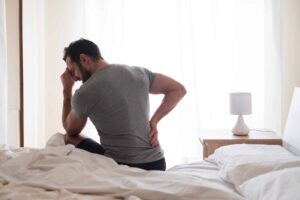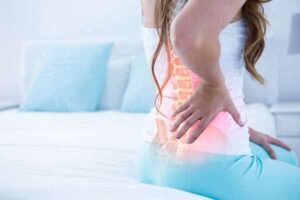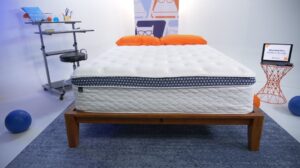Sleep & Acupuncture
Disclosure: By clicking on the product links in this article, Mattress Nerd may receive a commission fee at no cost to you, the reader. Read full disclosure statement.
Mattress Nerd consulted Dr. Tom Ingegno, DACM, MSOM, LAC to ensure that this article met our editorial standards
Acupuncture is a 3,000-year-old healing technique of Traditional Chinese Medicine. Its benefits have been challenged by Western medicine, but the practice has become much more accepted in the United States as a form of alternative medicine. In fact, the National Institutes of Health (NIH) has documented and publicized several studies that show acupuncture as both safe and effective in treating a range of conditions. Many health insurance policies also cover acupuncture for treatments such as pain relief.
Acupuncture is performed by specialists highly trained in the practice. Most states require acupuncturists to be certified by the National Certification Commission for Acupuncture and Oriental Medicine (NCCAOM), a program that takes about three-and-a-half years to complete.
Generally speaking, acupuncture involves the insertion of very thin, sterile needles into the skin at strategic points on the body, called acupoints. Most people feel no pain or, if anything, minimal discomfort when the needles are gently placed. The needles stay in place five to 30 minutes, during which most people report feeling very relaxed. There are also other acupuncture methods that use pressure, heat, or herbs.
Acupuncture is used to release blocked energy in the body, called “qi” (pronounced chee). Practitioners of Traditional Chinese Medicine believe qi flows along the pathways, or meridians, within the body that connects the acupoints and helps keep the opposing forces of yin and yang in balance. When yin and yang are in balance, it is a sign of good health. When qi is blocked, it knocks the yin and yang out of balance. This can create or accentuate pain, or impede the body’s natural ability to heal itself.
The frequency and number of treatments vary depending on your health, the condition you are seeking treatment for, and the method you choose. Some people experience dramatic relief after the first treatment while people with more complex or chronic issues may require one or two treatments per week for several months.
Acupuncture is most commonly used to treat pain, like back or neck pain. But the practice is also used to treat a variety of other conditions. Case-controlled clinical trials have shown the therapy to be effective in treating diseases, symptoms, or conditions including nausea, migraines, anxiety, depression, infertility, and insomnia.

Different Acupuncture Techniques
According to Traditional Chinese Medicine, there are specific acupoints throughout the body that if stimulated and/or manipulated, can provide various therapeutic benefits. Here is a brief overview of the different methods of acupuncture.
Body acupuncture: This method involves the insertion of tiny, hair-thin needles into acupoints throughout the body. “In a typical acupuncture session, tiny needles are placed at points along the meridian pathways of your body. Those needles are placed strategically to release the blocked up energy within your body and help you rebalance yourself. During this 30-minute session, research studies have shown that this ancient practice can provide numerous benefits for your physical and mental well-being,” says Dr. Funk of Ideal Health.
Auricular acupuncture: This method focuses on acupoints in and on the ear. Some patients report that auricular acupuncture is less painful and more convenient than body acupuncture.
Acupressure: Acupressure is the practice of using firm pressure on acupoints instead of needles. This practice can be done on yourself, with some training, in the convenience of your own home.
Electroacupuncture: This method is often used along with acupuncture for the treatment of pain. Clips are placed on top of the acupuncture needles and deliver an electric current intended to create a stronger stimulation to the acupoints than acupuncture alone.
Cupping: Remember the giant hickeys on swimmer Michael Phelps’ back during the 2016 Summer Olympics in Rio? Those were the tell-tale marks of cupping, a method in which special cups are put on the skin at pressure points for a few minutes to create a suction.
Moxibustion: This method involves placing burning dried herbs on specific points along the body.

Acupuncture vs. Acupressure
Both acupuncture and acupressure work similarly to provide health benefits. Acupuncture uses tiny needles to stimulate acupoints while acupressure uses firm pressure to do the same.
People who are squeamish about needles might prefer needle-free acupressure over acupuncture. However, it may take you longer to feel the benefits of acupressure compared to acupuncture since acupuncture triggers a stronger stimulation and generally provides a faster response.
If your pain is acute, you’re better off with the stronger application and faster relief provided by acupuncture.
How Acupuncture Helps You Sleep
Acupuncture involves the stimulation and manipulation of acupoints on the body — either through needles, pressure, or other means — to improve the flow of qi. This provides numerous benefits:
- Pain relief
- Reduced anxiety
- Relaxation
All these translate to improved sleep. Some researchers believe that acupuncture helps sleep by creating a sense of relaxation by influencing changes in neurotransmitters involved in emotional regulation. Another theory posed by Harvard-trained researcher, Dr. Bruce Pomeranz, is that acupuncture stimulates peripheral nerves that send messages to the brain to release endorphins, the so-called feel-good chemicals that block pain.
Even with regular acupuncture treatment, quality sleep can be elusive if your mattress is uncomfortable. Mattresses should be viewed as an investment in your good health, and many on the market today offer benefits such as lumbar support, spine alignment, and pressure point relief to soothe aches and pains so you wake feeling refreshed.
Unlike acupoints targeted by acupuncturists to promote the flow of qi, pressure points are areas on the body that can become sore and painful when lying on them. Since most sleepers are side sleepers, pressure points affected by mattresses most often involve the shoulders and hips.
Can Acupuncture Cure Sleeping Disorders or Disturbances?
Acupuncture has been studied as a treatment in several sleep disorders and other conditions that impede a good night’s sleep:
Insomnia
Many acupuncturists consider insomnia a significant indicator of disturbance in mind/body energy. Acupuncture can release this buildup of energy and balance qi, which can lead to better sleep.
There are several studies that theorize the science behind how acupuncture relieves insomnia. According to a study titled “Acupuncture Increases Nocturnal Secretions and Reduces Insomnia and Anxiety: A Preliminary Report,” published in the Journal of Neuropsychiatry and Clinical Neurosciences, acupuncture can be effective in treating certain kinds of insomnia by raising naturally occurring levels of melatonin, the so-called sleep hormone.
The study involved 18 adults who suffered from both anxiety and insomnia and underwent five weeks of acupuncture treatment. Researchers monitored their levels of melatonin during the course of the study and found that the patients’ nightly levels of melatonin production increased after undergoing acupuncture treatment. Participants also reported better quality of sleep and a significant reduction of their anxiety levels. According to Dr. Tom Ingegno, doctor of Acupuncture, “Acupuncture releases naturally occurring endocannabinoids, including anandamide, AKA the ‘bliss molecule.’ The endocannabinoid system was discovered in 1991 and is associated with feeling good as it bonds to the same receptors as cannabis. This is a big part of why people feel ‘blissed out’ post acupuncture treatment. This sensation can last for a period of time and will also help people sleep at night.”
Another study, published in the Journal of Alternative and Complementary Medicine, found that acupuncture can increase levels GAMA, or gamma-aminobutyric acid, a naturally occurring amino acid found in the nervous system. Low levels of GAMA have been found to reduce the quality of sleep while higher levels enable the body and mind to relax and enhance sleep quality.
Sleep Apnea
Sleep apnea is a potentially serious sleep disorder that occurs when breathing repeatedly stops and starts during sleep. This is caused by the tongue and soft tissue falling to the back of the throat and blocking the airway. Some sufferers of sleep apnea can suffer a dangerous drop in blood oxygen saturation, which can lead to complications in tissue and organs.
According to Traditional Chinese Medicine, sleep apnea is a sign of qi stagnation aggravated by phlegm accumulation. Acupuncture along with dietary therapy can relieve symptoms of sleep apnea by increasing the flow of qi and reducing the presence of phlegm.
There are studies that back up the theory. According to an analysis of six controlled trials published in the journal Evidence-Based Complementary and Alternative Medicine, researchers found that acupuncture and electroacupuncture were highly effective in reducing episodes of apnea and improving oxygen saturation.
Acid Reflux/GERD
Acupuncture is used to treat a variety of digestive disorders including food allergies, gastritis, ulcers, irritable bowel, and colitis. A study published in the Chinese Journal of Integrated Medicine showed that acupuncture is also just as effective at reducing patients’ acid reflux attacks as heartburn medication, but with comparatively fewer adverse side effects.
Western medicine emphasizes diet control and the use of acid-reducing medications to treat acid reflux and symptoms of gastroesophageal disease, or GERD — conditions that often are worsened at night when we lie down to sleep.
Traditional Chinese Medicine views the source as coming from one of several locations within the body, including the gallbladder, pancreas, liver, or spleen, all of which work together to aid in the stomach’s digestion. An imbalance in the function of any of these organs can result in acid reflux and heartburn.
Acid reflux is also closely linked to stress. Emotional stress can trigger nerves in the brain that control stomach secretions and stomach muscle contractions. Practitioners of traditional Chinese medicine seek the source of your acid reflux and, using acupuncture, restore your energy flow to naturally reduce the overproduction of stomach acid.
Restless Leg Syndrome (RLS)
Restless Leg Syndrome, or RLS, is characterized by an unpleasant sensation in the legs that causes an irresistible urge to move them. This sensation is often described as an itching, crawling, pulling, aching, throbbing, or pins-and-needles. RLS typically occurs in the evening and is worse at night when you’re trying to sleep. As a result, it can disrupt sleep.
Western medicine links RLS to iron deficiency, kidney disease, hypothyroidism, fibromyalgia, diabetes or Parkinson’s disease. Traditional Chinese Medicine identifies RLS symptoms as a result of long-term energy obstruction in the leg extremities that disturbs the flow of protective qi. According to a clinical case study, acupressure can provide immediate relief of sensory symptoms and motor signs of restless leg syndrome. This is achieved by mediating neuro-hormonal activities through acupuncture stimulation techniques at precise acupoints.
Another study published in the Journal of Acupuncture and Meridian Studies that compared RLS patients taking the nerve pain drug gabapentin in addition to acupuncture with patients taking gabapentin alone found that patients in both groups saw a significant improvement in RLS symptoms. But, patients in the acupuncture group experienced much better sleep than study participants who did not undergo acupuncture.
Night Sweats
Night sweats are an annoying problem that awakens people at night. In some cases, sufferers have to change their sleepwear and bed linens because they have sweated so much. This sleep disturbance is quite common and not usually a cause for concern. Menopause is a likely culprit. Some causes, however, may indicate a medical issue, such as infection, cancer, medication side effect, or a nervous or endocrine disorder. Be sure to talk with your doctor if you suffer from night sweats accompanied by symptoms such as fever, racing heart rate, and unexplained weight loss.
According to a study published in the journal Menopause, acupuncture effectively reduced the frequency of hot flashes and night sweats. Even more impressive, results were maintained six months after treatments stopped.
It is believed that acupuncture relieves night sweats by:
- Decreasing secretions of calcitonin gene-related peptide, which has been shown to trigger hot flashes;
- Increasing secretions of melatonin, a hormone that induces sleep and lowers body temperature;
- Elevating endorphins, which reduce feelings of discomfort.
Pregnancy & Acupuncture
Even in the early days of pregnancy, sleep can be a challenge, thanks to an increase in progesterone as well as metabolic changes — necessary processes for maintaining pregnancy. Nausea, painful breasts, frequent urination, heartburn, and general discomfort as your pregnancy progresses mean you’re in for nine months of sleep interruptions. (Never mind the interrupted sleep you’ll have after the baby comes.)
Studies show acupuncture is safe and effective at helping pregnant women sleep. The therapy can soothe pregnancy symptoms that interfere with sleep so you can get much-needed rest. According to Dr. Amy Dobbie, a naturopath doctor with The Womb, acupuncture can be used during any trimester. In the first trimester, acupuncture can help nourish the body and alleviate symptoms such as fatigue, nausea, and heartburn. As your pregnancy progresses, acupuncture can tame aches and pains, constipation, and swelling.
The best time for acupuncture is actually during the third trimester, Dr. Dobbie explains. Beginning at 36 weeks, acupuncture can prepare your body for labor by relaxing and softening the uterine ligaments and bringing blood flow to the pelvis. Studies show that starting acupuncture in the weeks just before delivery increases the chances of spontaneous labor around the due date, reduces the risk for medical intervention such as C-section or epidural, and speeds up the delivery process by an average of about 1.5 hours.
Women who are considering acupuncture to treat pregnancy symptoms should first talk to their healthcare provider about possible risks, and only seek treatment from a licensed acupuncturist.
Chemotherapy & Acupuncture
People undergoing chemotherapy can experience difficulty sleeping for various reasons:
- Chemotherapy drugs can make patients feel exhausted, causing them to nap during the day, which interferes with sleep at night.
- Some medications, such as steroids to combat chemotherapy-related nausea and vomiting, can make you feel energized and make it difficult for you to settle down to sleep at night.
- The stress and worry of cancer and undergoing treatment can cause sleep problems.
According to a study published in the journal Integrative Cancer Therapies, acupuncture was superior compared to placebo acupuncture (acupuncture without qi stimulation), conventional drug therapy, and hormone therapy for the management of cancer-related insomnia.
Acupuncture may also help cancer patients’ quality of life by lessening feelings of depression, emotional distress, and pre-chemotherapy anxiety.
People with cancer considering acupuncture should first talk with their healthcare provider about possible risks or interactions. For example, acupuncture is not recommended for patients on blood thinners or with bleeding disorders. (See Acupuncture Risks, below)

Acupuncture Risks
Acupuncture has been practiced for thousands of years and is considered a safe and effective treatment for dozens of diseases and conditions when practiced by a licensed acupuncturist. Even more reassuring, the U.S. Food and Drug Administration (FDA) regulates acupuncture needles as medical devices and restricts their use to only licensed practitioners.
The FDA requires needles to be sterile, nontoxic and labeled for single use. Reusing needles can spread infectious diseases, so be sure your practitioner uses a new package of sterile, single-use needles at each appointment. Each puncture site should also be swabbed with alcohol before the needle is inserted.
While safe for most people, acupuncture is not recommended for the following individuals:
- People taking blood thinners/anticoagulants.
- People with bleeding disorders.
- Anyone with a pacemaker, infusion pump, or other electrical medical devices should not undergo the electroacupuncture method of acupuncture.
Side effects and complications with acupuncture are quite rare, but include:
- Bleeding from the insertion site
- Soreness at the insertion site
- Bruising at the insertion site
- Dizziness
- Fainting
- Local internal bleeding
- Convulsions
- Hepatitis B
- Dermatitis
- Nerve damage
- Increase in pain
- Internal organ injury (rarely)
Meet Our Medical Reviewer
Dr. Tom Ingegno, DACM, MSOM, LAC Dr. Tom Ingegno, Doctor of Acupuncture and Chinese Medicine, has over 20 years of experience in the integrative and functional medicine space. He owns and operates Charm City Integrative Health, a multifaceted clinic that NYT bestseller and futurist David Houle called, the “Future of Medicine.”



